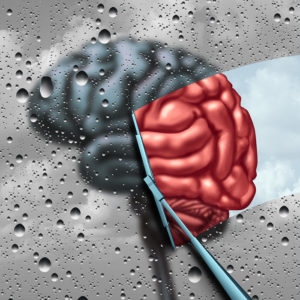Table of Contents
Best Nootropics for Brain Fog
“Brain fog” has become a blanket term we use when we’re not thinking clearly. Or we’re feeling fatigued, cranky, distracted, and our mental processing speed has slowed to a crawl.
Brain fog is an unwanted and certainly inconvenient side effect of our always-connected lifestyle.
Turns out that once you recognize the symptoms and learn a little about the underlying causes of brain fog. You can come up with a strategy for eliminating brain fog from your life. Once and for all.
In this post you’ll learn how to know if you have brain fog, and its causes. Which are a little more sinister than the name suggests.
And you’ll get tips throughout this post to eliminate brain fog.
Symptoms of brain fog
Your doctor won’t find a clinical definition of “brain fog” in a medical reference manual. And will likely dismiss your concerns or tell you it’s “all in your head”.
Well, at least she got that part right. Brain fog is primarily in your head.
And your symptoms could be lack of focus, mental fatigue, confusion, forgetfulness, cloudy or slow thinking, and difficulty communicating.
Causes of brain fog
In one study of 132 people aged 14 – 29 years, study subjects reported they thought their brain fog was due to fatigue, lack of sleep, prolonged standing, dehydration, or feeling faint.[i]
But we have plenty of other peer-reviewed clinical studies looking into the underlying causes of brain fog.
When you dig into the research it becomes apparent that brain fog can be filed under two main categories. It’s either due to a physical/neurological issue or it’s life-style related.
In this post we’ll deal primarily with the underlying neurological problems contributing to your brain fog. And which nootropics best address each of these issues.
Once you’ve read this entire post and are still not sure what is causing your brain fog, I suggest putting together a stack of supplements. One from each category mentioned below.
Chances are you’ll get rid of your brain fog even if you never do figure out what is causing it.
Oxidative stress and cognitive function
Your brain consumes 20% of the oxygen (O2) your body uses to support its 86 billion neurons and trillions of synapses. All supported by 250 – 300 billion glial cells.
 Your brain must “breathe” to think. To understand just how critical oxygen is to your brain, studies demonstrate that depriving your brain of oxygen for just a minute during a stroke kills 1.9 million neurons and 14 million synapses.[ii]
Your brain must “breathe” to think. To understand just how critical oxygen is to your brain, studies demonstrate that depriving your brain of oxygen for just a minute during a stroke kills 1.9 million neurons and 14 million synapses.[ii]
Neurons die because without enough O2, mitochondria are unable to reduce O2 to H2O to support ATP synthesis.
Your brain maintains strict control over how oxygen is used. Because it’s needed for critical functions including synaptic plasticity used in memory formation, and redox signaling for normal mitochondrial function.
It’s when this natural reaction breaks down for a multitude of reasons.[iii] And produces free radicals such as superoxide anion (O2–), hydrogen peroxide (H2O2), and hydroxyl (OH).
These unwanted free radicals that are produced are called “oxidative stress”. Oxidative stress happens when the production of reactive oxygen species (ROS) in your brain overwhelm your built-in antioxidant defense system.
And is often the underlying cause of a host of neurodegenerative diseases including brain fog.[iv]
Oxidative stress has also been shown to increase the likelihood of developing a “leaky” blood-brain barrier. When this barrier becomes permeable it allows all kinds of nasty things to enter and damage your brain.[v]
Learn how to heal a leaky blood-brain barrier here > How to Heal a Leaky Blood-Brain Barrier
But we can also keep oxidative stress under control with nootropics which act as antioxidants.
Vitamin C
Vitamin C (ascorbate) – your brain contains more Vitamin C than any other organ in your body. It’s a powerful antioxidant, and reactive oxygen species (ROS) scavenger. And participates in recycling of other brain antioxidants including Vitamin E.[vi]
Vitamin E
Vitamin E – four tocopherols and four tocotrienols: α (alpha), β (beta), γ (gamma) and δ (delta). Protects cells from damage associated with oxidative stress caused by free radicals.[vii] Look for a Vitamin E supplement that is food-sourced with all 8 isomers if you can find it.
CoQ10
Coenzyme Q10 (CoQ10) – CoQ10 provides fuel for mitochondria for optimal brain health. And protects mitochondria from oxidative stress. Low levels of CoQ10 results in slow mental processing, cognitive decline, and brain fog.
L-Carnosine
L-Carnosine – provides a powerful antioxidant effect and can even help to revive mitochondria even if they have stopped functioning because of oxidative stress.
Gotu Kola
Gotu Kola – protects your brain from toxins and oxidative stress. Studies show it helps protect against heavy metals and food additives which cause brain fog, mood swings and migraines. It boosts cerebral blood flow. And it reduces oxidative stress by reducing free radicals in brain cells.[viii]
 Inflammation and brain health
Inflammation and brain health
The simplest way to find out if your brain fog is caused by inflammation in your brain is to learn how to read the lab tests your doctor ordered.
Learn how to recognize and read your own blood work and you’ll know for sure if you are dealing with inflammation.
C-Reactive Protein (CRP) and brain fog
C-Reactive Protein (CRP) is a very powerful indicator of inflammation both in your body and brain.
CRP is a protein made in your liver and sent into your bloodstream in response to inflammation.
A low risk reading for a standard CRP test is less than 1.0 mg per liter (mg/L) for women, and less than 0.55 mg/L for men.
A test result showing a CRP level greater than 1.0- 3.0 mg/L is a sign of average risk for inflammation. And CRP readings greater than 3.0 mg/L are high risk.
Elevated levels of C-reactive protein are implicated in developing type II diabetes[ix] and stroke.[x] And elevated CRP levels also manifest as problems with information processing, recall, memory and brain fog.[xi]
Inositol
Myo-inositol can help lower C-reactive protein levels.[xii]
Rhodiola Rosea
Rhodiola Rosea extract has been shown in clinical studies to reduce CRP levels.[xiii]
DHA (Omega-3)
DHA (Omega-3) helps lower C-reactive protein levels.[xiv]
Acetyl L-Carnitine (ALCAR)
Six separate peer-reviewed clinical studies show Acetyl L-Carnitine (ALCAR) effective in lowering CRP.[xv]
Vitamin C
A study in Spain demonstrated the Vitamin C from drinking fresh orange juice reduced C-reactive protein in men and women.[xvi]
Vitamin E
And Vitamin E reduces C-reactive protein levels.
CoQ10
But adding CoQ10 to Vitamin E is even better and amplifies its effects in lowering CRP.[xvii]
Pro-inflammatory cytokines and brain fog
Pro-inflammatory cytokines tumor necrosis factor-a (TNF-a), interleukin-1 beta (IL-1b), interleukin-6 (IL-6), and interleukin-8 (IL-8) all contribute to regulating C-reactive protein.
And being able to recognize these cytokines on your lab tests can help you identify the cause of inflammation happening in brain. The same inflammation that may be causing your brain fog.
These cytokines are cellular growth factors synthesized in nearly every cell in your body. Generally, only in response to stress. There is growing evidence that depression is associated with elevated levels of proinflammatory interleukin-6 (IL-6).[xviii]
Excess proinflammatory cytokines can cause severe inflammation leading to brain fog. And worst case, Alzheimer’s and Parkinson’s Disease.
They can deplete neurotransmitters which lead to brain fog. And excess cytokines can even result in anxiety, depression, fatigue, and overall poor mental performance.
Adding Artichoke Extract (Luteolin), Cat’s Claw, Ginseng, L-Glutamine, Oat Straw, SAM-e, Vitamin B3 (Niacin), Vitamin B6 (P-5-P), Vitamin B8 (Inositol), and N-Acetyl L-Cysteine (NAC) to your nootropic stack can keep proinflammatory cytokines under control.
But make sure you review each nootropic linked to above because certain nootropics may only control one or two of these inflammatory cytokines.
Then find out which ones work for what’s indicated in your lab tests.
Hormone imbalances and brain function
 Thyroid stimulating hormone (TSH) is secreted by your pituitary gland which controls thyroid hormone secretion by your thyroid. Your thyroid then releases thyroxine (T4) and triiodothyronine (T3, free).
Thyroid stimulating hormone (TSH) is secreted by your pituitary gland which controls thyroid hormone secretion by your thyroid. Your thyroid then releases thyroxine (T4) and triiodothyronine (T3, free).
Iodine is the essential trace element that combines with the amino acid tyrosine to form thyroid hormones T4 and T3.
Thyroxine (T4) contains four iodine atoms, and triiodothyronine (T3) contains three iodine atoms.
Within your brain, T4 is converted to T3 by selenium which then affects gene expression controlling metabolism within cells. And activates the catecholamines dopamine, norepinephrine and epinephrine.
A malfunctioning thyroid caused by iodine deficiency results in brain fog. And one of the easiest ways to eliminate brain fog is by simply adding iodine to your daily nootropic stack.
Nutrient deficiencies and cognitive performance
Fernando Gómez-Pinilla, professor of neurosurgery at UCLA analyzed more than 160 studies about the effects of food on the brain. And concluded, “Food is like a pharmaceutical compound that affects the brain”.[xix]
To help put what Professor Gómez said in perspective it helps to understand the composition of your brain.
If you eliminated all the water from your brain, you’d be left with mostly fats in the form of lipids. The rest is comprised of various amino acids, proteins, micronutrients and glucose.
These amino acids, proteins and micronutrients are provided by the food you eat. In a perfect world you would be getting everything you needed from food.
But we know this is not a perfect world. And no matter how diligent you are in eating the perfect diet, you’re still not getting the nutrients your brain needs.[xx]
The result can be anxiety, depression, poor memory and certainly can include brain fog.
For an in-depth study of nootropic foods and their effect on brain function, please see my post: “Nootropic Foods – the Effects of Nutrients on Brain Function”.
With some effort and a little discipline, you can make some simple changes to your diet based on the revelations in that post. And you should feel the difference in cognitive function and how you feel, and how your brain works.
But if you find you’re still not as alert as you should be. Concentration is difficult. And you’re still struggling with brain fog. Consider using a high-quality multivitamin/mineral supplement.
The Performance Lab® NutriGenesis Multi is by far the best multivitamin/mineral supplement I’ve ever tried. I can actually feel the difference when using it and continue to use every single day.
With a better diet and the support of a good multivitamin, you should notice changes in how you feel in as little as a week or two.

Lack of quality sleep can cause brain fog
There’s nothing quite like a full deep sleep. And waking refreshed the next day.
In fact, we humans covet sleep so much we’ll try just about anything to help us sleep. Because if we don’t, we’ll be dealing with poor mental clarity and brain fog the next day.
So we’ll try things like Ambien® (zolpidem) to help us sleep. The problem with zolpidem is it works as an agonist of GABAA receptors which can result in cognitive impairment.
Turns out this mechanism of action is very similar to using benzodiazepines (benzos) for sleep. They cause problems with memory consolidation and can result in brain fog the next day.[xxi]
OTC sleep aids containing the antihistamine diphenhydramine work by preventing acetylcholine (ACh) action.
Low ACh can lead to brain fog, mental confusion, delirium, blurred vision, memory loss and hallucinations.[xxii]
And if you try to go ‘natural’, you’ll find most ‘natural’ sleep aids on the market contain synthetic melatonin.
But not only is this form of melatonin not natural, a study published in the Journal of Sleep Medicine showed something very alarming.
Researchers found that synthetic melatonin content ranged from -83% to + 478%. Contrary to what was claimed on sleep supplement labels.[xxiii]
If you are as sensitive to melatonin as a supplement as I am, taking a chance on nearly 500% more than what you thought you were getting is a big problem.
A much safer and more effective choice in getting a good night’s sleep is 3 supplements that are easy and relatively inexpensive to get.
Tart Cherry Extract
Tart Cherry is the richest natural source of melatonin. Identical to the hormone secreted by the pineal gland in your brain.
Magnesium
Magnesium stimulates GABAA receptors much the same as prescription sleep aid Ambien® (zolpidem). And increases working memory.[xxiv]
And calms nerve cell signaling, boosts nitric oxide (NO) which helps relax smooth muscle cells, lowers blood pressure, and helps with memory consolidation while you sleep.
L-Tryptophan
And L-Tryptophan is one of the best natural sleep aids available without the unwanted side effects of prescription sleep meds.
It helps in the synthesis of serotonin, and melatonin for a good night’s sleep. And no brain fog the next day.
For more tips on getting a good night’s sleep, please see my post “Best Sleep Supplements”.
Lack of BDNF can result in brain fog
Brain-Derived Neurotrophic Factor (BDNF) is a naturally occurring protein that is responsible for the growth, maintenance and survival of neurons.
BDNF prevents apoptosis (brain cell death), induces the growth of new neurons (neurogenesis) and synapses (synaptogenesis), and supports cognitive function.
Higher levels of BDNF can increase cognition, mood, productivity, mental clarity, and memory. And decrease the risk of neurodegenerative diseases like Alzheimer’s and Parkinson’s Disease.
But a lack of adequate Brain-Derived Neurotrophic Factor (BDNF) is going to cause a host of problems. Including brain fog and poor cognitive performance.
I have identified at least 13 ways to boost levels of BDNF in your brain with nootropic supplements.
Ashwagandha
Ashwagandha has been shown to help regenerate axons and dendrites, reconstruct synapses, and restore neural networks by increasing BDNF to support brain health.[xxv]
Gotu Kola
Gotu Kola extract increases dendrite and axon growth in the brain which helps boost memory boosting BDNF concentrations in the brain and improve improve brain health.[xxvi]
L-Theanine
And L-Theanine, which naturally occurs in green and oolong tea, provides antianxiety and antidepressant effects “through induction of BDNF in the hippocampus and the agonistic action of L-Theanine on the NMDA receptor”.[xxvii]
For more ways to increase BDNF in your brain to boost brain health and reduce brain fog, see my post, “13 Nootropics to Boost BDNF”.
 Personalize your brain fog fix strategy
Personalize your brain fog fix strategy
Now that you know what brain fog is and the underlying causes of this debilitating condition, it’s time to put together a plan to eliminate it from your life.
The thing is, most of us are not walking around thinking about oxidative stress. But now that you know what it is you can assume it’s something you need to deal with.
Begin by using Vitamin C and the right kind of Vitamin E, CoQ10, and L-Carnosine as part of your daily routine to help reduce brain fog and boost cognitive function.
Take a look at your latest lab work and find out if you have issues with elevated proinflammatory cytokines (see section above) or C-Reactive Protein (CRP).
If it’s CRP then start using Myo-inositol, Acetyl-L-Carnitine (ALCAR) and a high quality DHA supplement every day to promote brain health.
If it’s elevated cytokines, choose 2 or 3 nootropic supplements from the list above and use them daily. And tame the inflammation in your brain.
You’ll know you’re successful when you check with yourself in a week and realize there is no more brain fog and better brain function.
If your labs show your thyroid hormones are low, then start with iodine and selenium every morning.
And only you can know if lack of sleep is contributing to your brain fog. If it is, see my post linked above on finally getting some quality sleep.
Brain-Derived Neurotrophic Factor (BDNF) has been called Miracle Gro® for the brain. There is no doubt we need adequate levels of BDNF to enhance brain function and to function well.
And we have 13 ways to boost BDNF levels in our brain. Add one or two to your nootropic stack.
If you can’t decide which nootropics to try, get a high quality pre-formulated nootropic stack like Mind Lab Pro® which includes Vitamins B6, B9, B12, Citicoline, Bacopa Monnieri, Lion’s Mane Mushroom, Phosphatidylserine (PS), N-Acetyl L-Tyrosine (NALT), L-Theanine, Rhodiola Rosea, and Pine Bark Extract.
And Performance Lab® Energy can help you keep C-Reactive Protein (CRP) under control. Because it includes Acetyl-L-Carnitine (ALCAR), Coenzyme Q10, R-Lipoic Acid, and PQQ.
Finally, let’s agree that the experts are likely right. We’re not getting the nutrients our brain and body need from the food we eat. Which could be contributing to your brain fog issues. And problems with memory and cognitive function.
So using a high-quality multi like the Performance Lab® NutriGenesis Multi will provide the nutrients you’re not getting from the food you eat every day.
You no longer need to live with brain fog. Using the information in this post and the right nootropic supplements, and you’ll you’ll avoid cognitive decline and be free of brain fog forever.







Join The Discussion - 50 comments
sher
March 13, 2024
I receive your email newsletter and enjoy it. Is there a reason you don’t create links in them? I have to copy and paste to get to the referenced article. Is this a test for focus and brain fog? I copy and paste this rather long blurb: (https://nootropicsexpert.com/best-supplements-for-brain-fog/?utm_source=Nootropics+Expert+Newsletter&utm_campaign=9b425430ce-EMAIL_CAMPAIGN_2024_03_10_03_48&utm_medium=email&utm_term=0_-9b425430ce-%5BLIST_EMAIL_ID%5D)
David Tomen
March 15, 2024
Sher, I do not understand what problem you are having with my newsletter. I often include links to articles I reference in the newsletter and clicking on that link should take you directly to that article here on this website.
If that is not happening then it is a setting in your email program. If you do not know how to change it I suggest contacting your email provider and ask them why you cannot click on links in your email.
This is a problem on your end with your email program and must be taken care of on your end.
William
February 15, 2024
Hi David and thanks for all the information you share. Since my OCD manifested itself 10 years ago I have struggled with brain fog, in particular I find it very difficult and tiring to speak, I mean I know what to say but it’s as if the process of moving from thought to speech is very difficult. It’s very frustrating. I couldn’t believe it because I was so sharp before OCD and I had to drop out of university because of it. In recent years, even when my OCD has been under control through psychotherapy like now and therefore I am not bothered by constant thoughts, my ability to speak only improves now and then and not completely. Two months ago I started taking a B complex and magically regained my mental clarity and my old ability to speak. I also started to feel more energetic, motivated and able to look people in the eye. But unfortunately it only lasted for 35-40 days , then these effects decreased. I am continuing to take the supplement (100% RDA of each B vitamin because too high a dosage makes me anxious). I don’t have much money because I’m unemployed so I can only afford one more supplement at the moment. If you had to bet on a single supplement to improve my speaking ability, what would it be?
Thank you very much, really
David Tomen
February 15, 2024
William, there are studies that show certain B-Vitamins reduce the symptoms of OCD. Another that may help you is Uridine Monophosphate (https://nootropicsexpert.com/uridine-monophosphate/). Use 250 mg twice per day.
jill
February 2, 2023
My consult with David has made a huge difference to my quality of life. His knowledge of brain difficulties and solutions to overcome them surpasses anything else you can find, bar non. I would recomend the book and a consult they are the best investment you will make in your brain health.
jill
David Tomen
February 3, 2023
Thank you Jill. Very kind of you. Much appreciated.